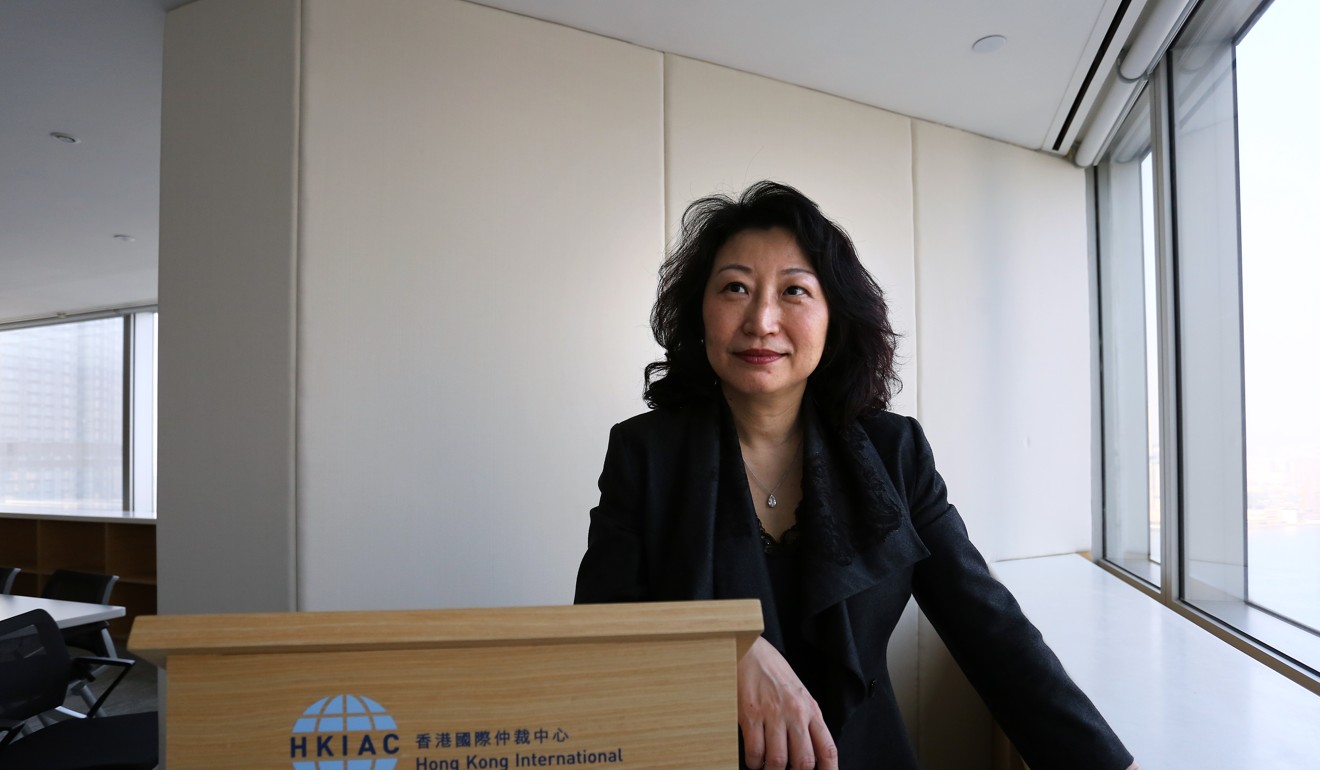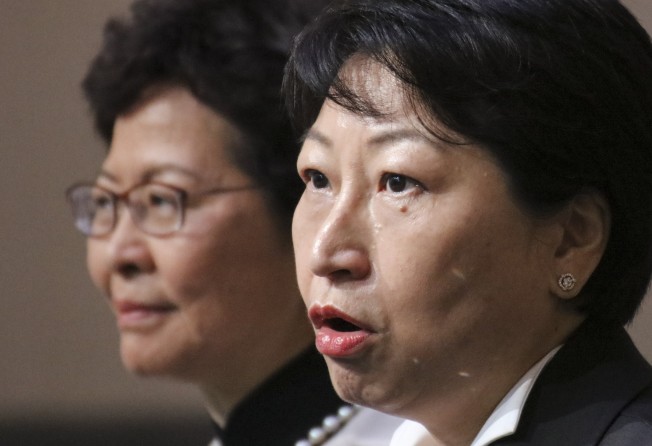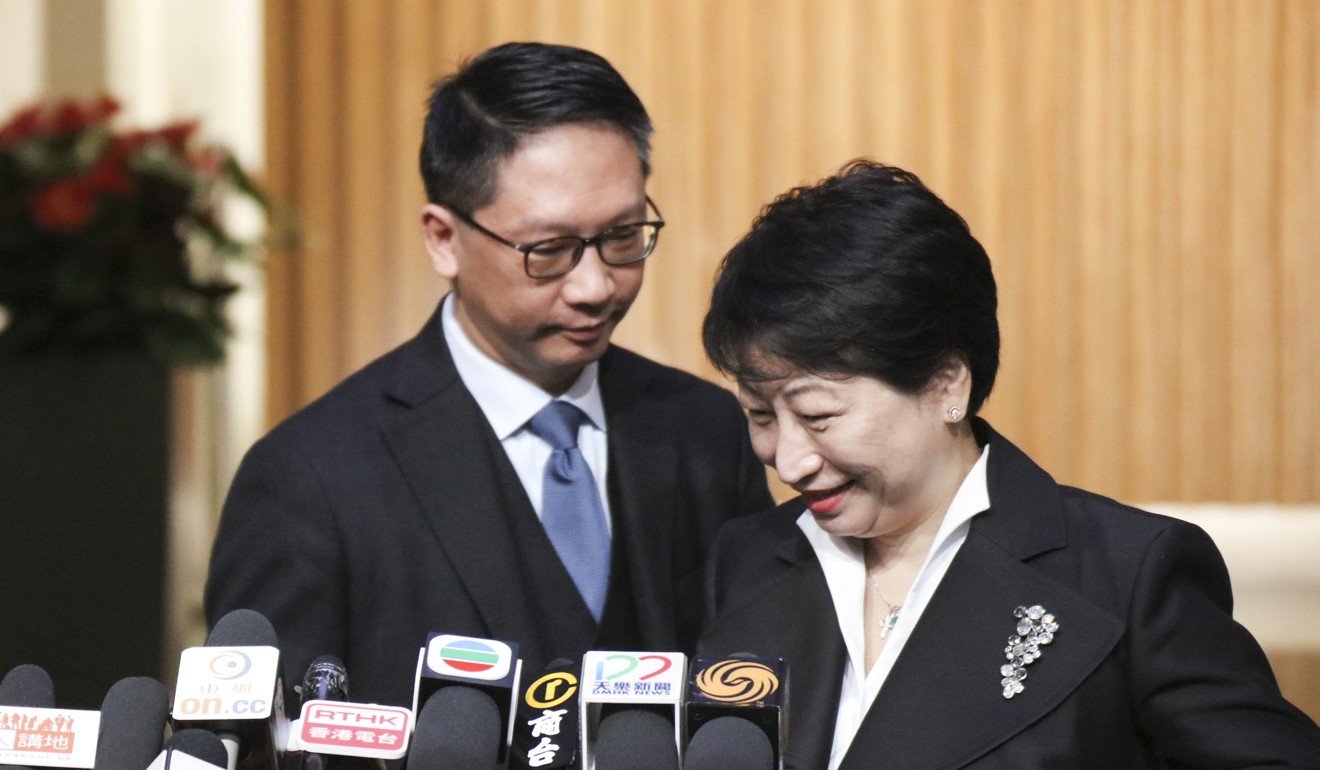
Will Teresa Cheng’s expertise in legal arbitration help her handle political issues as justice chief?
Those who worked with barrister on government bodies describe her as ‘moderate’ and ‘fair’

Hong Kong’s new justice minister Teresa Cheng Yeuk-wah won praise as a “fair” and “patient” co-worker when her appointment was announced on Friday, but the veteran arbitrator has yet to convince all that she could thrive in handling the sensitive issues flaring between the city and Beijing.
Taking over the hot seat from her predecessor, Rimsky Yuen Kwok-keung, from Saturday after the country’s State Council approved her appointment, Cheng already has a number of thorny issues on her desk, including local legislation on China’s national anthem law and a joint checkpoint arrangement for a high-speed rail link to Guangzhou.
As an arbitrator and lawyer, Cheng frequently took part in complex international commercial or investment disputes. She used to chair the Hong Kong International Arbitration Centre, and worked as a deputy judge, and later as a recorder at the Court of First Instance. Cheng has also served on various statutory or advisory bodies.
In 2003 and 2004, for example, Cheng represented the Hong Kong government as it opposed an application by the Society for the Protection of the Harbour to temporarily halt reclamation work in Victoria Harbour, citing legality issues surrounding the projects.

During the hearing, she worked closely with Carrie Lam Cheng Yuet-ngor, now the city’s leader who at the time was the top civil servant for housing, planning and lands.
The government eventually won the legal battle, and Lam stated publicly she “was deeply impressed by and admired” Cheng.
In fact, when Lam took office last July, Cheng was tipped to take over as justice secretary. But sources close to the chief executive told the Post that Cheng had turned down the offer. It was unclear why she eventually changed her mind.
Ronny Tong Ka-wah, who represented the society in the reclamation dispute, last month described Cheng as “a suitable choice” for justice secretary despite her lacking experience in prosecutions.
“If she were to be nominated, she would help Hong Kong develop in the area of arbitration ... under the ‘Belt and Road Initiative’,” he said, referring to the central government’s trade plan.
In 2011, Cheng represented the government in the landmark Congo case, which centred on Hong Kong’s policy on state immunity. The case triggered the first time a local court sought guidance from Beijing for an interpretation of the Basic Law, Hong Kong’s mini-constitution.

Many of Cheng’s previous appointments were also related to Cheng’s qualifications in both the engineering and legal fields. For example, she formerly chaired the Environmental Impact Assessment Appeal Board Panel, and handled disputes relating to infrastructural projects.
Executive Council convenor Bernard Chan, who worked with Cheng in a board to select the privacy commissioner back in 2015, described her as a very professional and impartial working partner.
He believed Cheng had the political wisdom and ability to take up her new challenges, including overseeing the drafting of local legislation for a controversial joint checkpoint arrangement at the city’s terminus of a cross-border high-speed rail link.
Last month, China’s top legislative body endorsed the arrangement, causing the local Bar Association to claim that the Basic Law had been “irreparably breached” and the city’s rule of law “severely undermined”.
The legislation is to be pushed through the Legislative Council by mid-July to pave the way for the rail link to begin operation as planned in the third quarter of this year.
Cheng was relatively well-known for chairing the Transport Advisory Committee from 2004 to 2010, and the Provisional Minimum Wage Commission from 2009 to 2011.
The committee advised the government on public transport operators’ application for raising their fare, while the commission succeeded in getting the business sector and labour unions to agree on HK$28 per hour as the starting point for Hong Kong’s first statutory minimum wage.
Former legislator Kwong Chi-kin, who was a member of the commission, called Cheng “a fair chairwoman respected by both the employers and employees’ representatives”.
It’s not easy to reach consensus in the current political atmosphere, but it’s good she possesses those qualities
“Cheng was very patient, and managed to forge consensus when the negotiation was about to fall apart,” Kwong said.
“She’s also a moderate person ... It’s not easy to reach consensus in the current political atmosphere, but it’s good that she possesses those qualities.”
Pan-democratic lawmaker Charles Mok, who was a member of the transport panel under Cheng’s leadership, also remembered her favourably.
But Mok questioned whether Cheng’s expertise on arbitration would help her defend the city’s high degree of autonomy and speak up for Hongkongers.
“Yuen was much worse than his predecessor,” he said, referring to Wong Yan-lung SC, who served from 2005 to 2012. “We can only hope that ministers including Cheng will really defend the ‘one country, two systems’ principle, and stand on Hongkongers’ side.”
Cheng is also an adviser to Our Hong Kong Foundation, a think tank chaired by Tung Chee-hwa, a former city leader and now a vice-chairman of China’s top advisory body.
A month before the chief executive election in March last year, Cheng revealed that Tung said in a regular meeting of the foundation that the city’s next leader should be someone who could lead a proactive administration.
“[Tung] mentioned that the leader should be able to bring Hongkongers hope and be trusted by the central government,” Cheng said at that time. Tung’s remarks were viewed as a warning to the pro-establishment camp to back Lam, who promised to take a proactive approach to governance.
Lam’s arch-rival, then financial secretary John Tsang Chun-wah, argued that a heavily divided Hong Kong needed a respite from the past few years of political turmoil and polarisation.
Additional reporting by Kimmy Chung